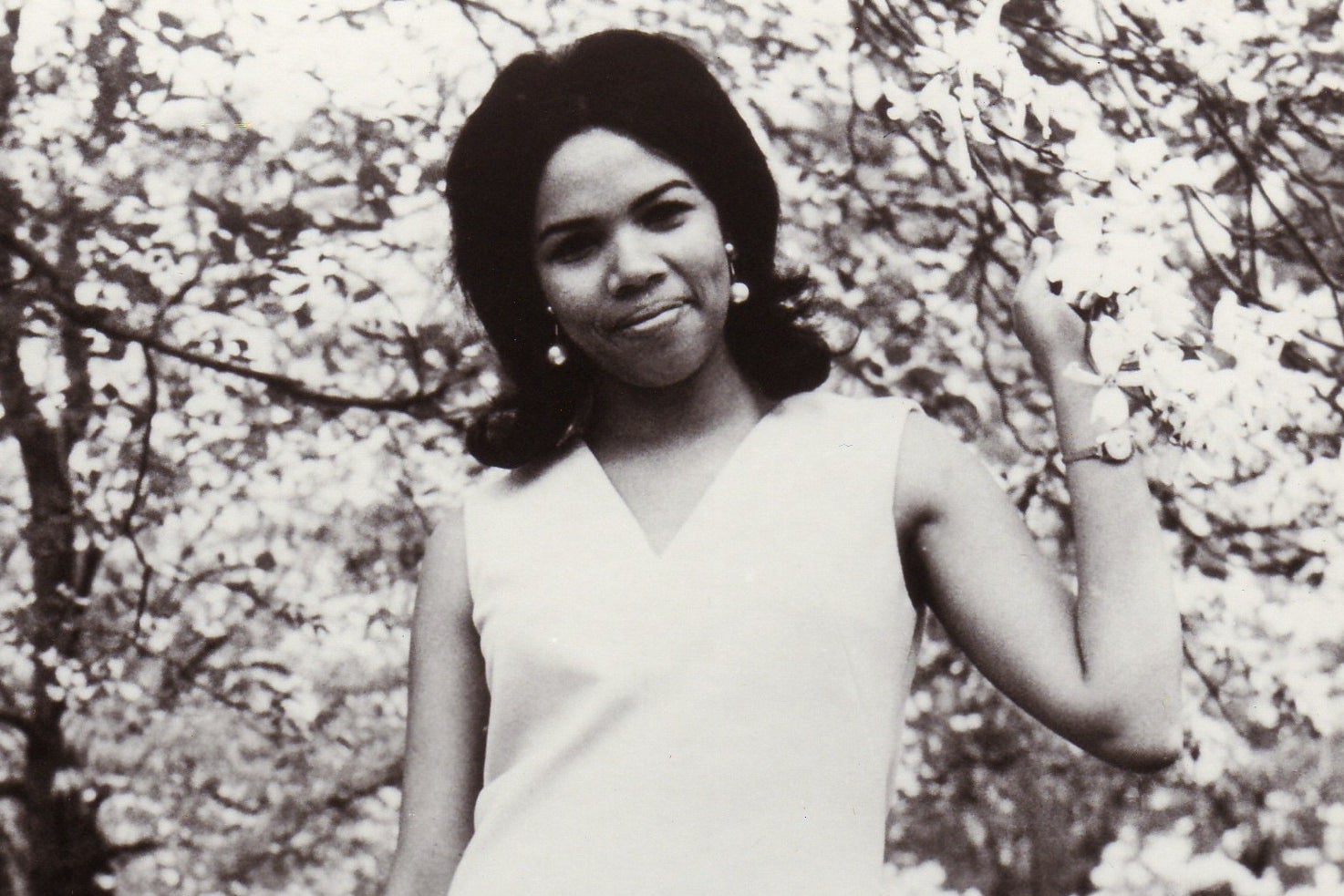
In an upstairs lounge at Hackney Picturehouse, Candi Staton is reflecting on the documentary that has just premiered on screen one. The American singer, a vivacious and very much active octogenarian, is one of the stars of the British-made I’ll Take You There: Discovering the Sound of Alabama, and the evening’s guest of honour.
“It is amazing,” she says, beaming, of this late-in-life recognition that’s brought her to London. “Years ago, when I was in my thirties, my forties, my fifties, people said: ‘God is saving the best for the last. Your last days will be your better days. Just be patient…’ So I always kept a mental positive attitude, and I kept those things in mind.”
Staton’s career may have got off to a glittering start, but this battle-hardened soul survivor spent much of her middle years languishing in the doldrums. From the late 1960s to mid-1970s, she had been a towering figure in Black American music, dubbed the First Lady of Southern Soul and acclaimed for her R&B covers of “Stand by Your Man” (a huge American hit in 1971) and “In the Ghetto” (a hit in 1972). Her 1976 single “Young Hearts Run Free” was a disco-era smash. But in 1982, at the age of 42, Staton – who’d been a functioning alcoholic – went sober and became a born-again Christian. Her conversion prompted a long run of gospel-only albums, none of which her fans wanted to hear. As she pithily puts it of her live shows during that period, “People are not saying: ‘Oh, I love you!’ They’re saying: ‘Get off the stage! We came to hear ‘Stand by Your Man’! We don’t want to hear the rest of that mess!’”
In the 1990s, however, the wheel turned once more when one of her mid-Eighties tracks, “You Got the Love”, became a dance-floor favourite. More recently, she’s made a series of Americana-flavoured albums that fuse her love of soul, country, gospel and R&B and which have brought a newfound lease of creative life – and adoration – well past retirement age. This most recent musical pivot is another reason for her trip from her home in Georgia: the International Lifetime Achievement gong that, when we meet at the start of this year, she is set to receive at the UK Americana Music Awards, which took place in late January.
In short, Staton – 85 years young next month and radiant in great-grandma bling (designer leather, Gucci loafers, bejewelled jeans, diamond-ringed fingers) – is now a bone fide musical icon. Nowhere is that more apparent in I'll Take You There. It’s a sprawling film that takes in Alabama’s status as a cradle of southern soul; the development of the legendary Fame recording studios in Muscle Shoals; this corner of the South’s importance to the civil rights movement; and the resonance of all these historical currents to an awestruck bunch of visiting UK Americana artists, who include Michele Stodart of The Magic Numbers and Bristolian singer-songwriter Lady Nade.
The connective tissue? Staton – a defiantly positive woman who thinks “everybody goes through the same things [in life]”. So, from the personal to the political, she still heeds the creed contained in the lyrics of her biggest song. “America’s messed up right now. And I do feel like throwing my hands up in the air, saying, Lord, I don’t care. But you got the love I need to see me through.”

The woman born Canzetta Staton has lived an extraordinary life, featuring five ex-husbands, several career stops and starts, plus that alcoholism-to-born-again-Christianity through line. Hers is a story of both personal trauma and 20th-century racial injustice, and it only makes her richly soulful music all the more emotionally impactful. Nowhere is this more the case than on her new album, Back to My Roots, a collection of covers and originals billed as the sound of the singer “return[ing] to her southern ways” and which features the spoken word track “1963”. That title refers to the events of 15 September 1963 – the day the Ku Klux Klan bombed the 16th Street Baptist Church, killing four young girls. By chance, Staton, a young mother married to the son of a preacher man, was also in Birmingham that day at another church service run by her father-in-law.
“We had just finished praise and worship and prayer, and the deacon came through the door and said: ‘Get out of here everybody! They’re rioting! They just bombed 16th Street Baptist Church. Four little girls got killed!’” she recalls. “They had targeted that church rather than ours because that one sometimes held civil rights [meetings] and Martin Luther King would often preach there [although not on that occasion].”
On “1963” she relays the rest of that “horrible” afternoon, when she and her two young sons had to escape Birmingham through the shattered downtown. “Oh what a sight to see, I’ll never forget it... People running, people cursing, people screaming, people crying, trying to get to safety … We made it through the crowd unharmed…” she declaims, her barely stifled tears audible on the recording. “When will this madness ever end?” Staton then takes purposeful care to name and honour the victims: Addie Mae Collins (14), Cynthia Wesley (14), Carole Robertson (14) and Carol Denise McNair (11).
In I’ll Take You There, we see a visibly stilled Staton visiting the 16th Street Baptist Church, along with Stodart and Lady Nade. She never met Dr King, nor saw him preach, because her first father-in-law “didn’t believe” in the civil rights movement. “He was like, let sleeping dogs lie.” Yet she herself had always been energised by the fight for racial justice, thanks to her experience as a teenage musician criss-crossing the South in the era of segregation. “I had experienced the horror of being on the road and seeing how [we were treated],” she says.
Staton’s extraordinary career began when she was 11, when she and her older sister Maggie were sent from their home in small-town Alabama to a religious school, the Jewell Christian Academy, in Nashville. The girls’ singing abilities were noticed by a pastor and, paired with another pupil, they were turned into the Jewell Gospel Trio and sent out on the road, the better to spread the school’s Christian mission – and earn it money.

She duly spent her tweens and teens “going to all these cities, playing with all these big artists – Mahalia Jackson, The Blind Boys of Alabama and everybody – in all these big auditoriums”. Yet it was also a time in which she and fellow artists such as Sam Cooke and Lou Rawls were forced to travel in “caravans” of vehicles for strength in numbers, parking up for the night in tight formation, or rushing for the safety of Black-friendly “safe houses” before darkness fell.
She recounts the story of touring with a “male quartet out of Nashville – you don’t have to name them, because I don’t want to embarrass the family … During those days, men had their hair permed. At night, to keep the waves in place, they wore head rags.” Motoring through Alabama one night, the convoy was stopped by police. “They were shining their flashlights in the cars. And [the police officer] saw their head rags, said the n-word and then: ‘Are you women or men? What you women doing with a moustache and beard?’”
They ordered the gospel quartet of the car and commanded them to sing. Then they wanted to know if they danced, too. On being told no, the four police officers drew their guns. “Well, you gonna dance tonight.” Staton pauses, eyes shining. “They started shooting up their feet, and they were trying to dodge the bullets. That’s an experience I’ll never forget. I was 14, 15.”
The police started shooting up their feet, and they were trying to dodge the bullets
A year later her time on the road came to an end. When she was 16, she discovered that the Jewell Gospel Trio’s fellow Chitlin’ Circuit stalwarts The Staples Singers were being paid – and allowed to keep what they were paid.
“I got to thinking: we don’t get fed, we don’t get paid, we don’t have any clothes, we wear robes ... They are using us,” she says of the trio’s elders and alleged betters at the Jewell Christian Academy. So, aged 17 she quit the road and went home to her mother in the “little country town” of Hanceville. It was a “culture shock” after all that touring, a place of “no cars, kerosene lamps … I didn’t know that Muscle Shoals was only 60 miles north,” she says of the home of Fame. “Look at fate, it’s amazing,” she marvels. But at the time, her abiding feeling was: “This is the pits! I know too much! I’ve seen too much! I’ve been around the world! And I got to settle for this?”
It was not long after this that she met her first husband. “This guy pulls up in this ’57 Chevy – and he was flashy!” she continues, beaming. “He liked me, so I started dating him, and I ended up getting pregnant... So I married him, but I wasn’t happy. He kept me forever pregnant for seven years – I had four children by the age of 27.” One of them, “my baby girl Cassandra”, 58, is here with Staton on this London trip, hovering nearby. (Not along for the ride are the grandchildren, who number “about 20”, and the 21 great-grandchildren.)
That relationship ended in divorce in 1968. Not long after that she embarked on a new relationship. She accuses the man involved of extreme coercive control and of using a date rape drug against her. “He said ‘Before I leave, let me fix you some breakfast…’ He brings the coffee back, I drink the coffee, and God be my witness, I don’t remember nothing after that. He put something in [the coffee].” Whenever she used to tell that story, she says, no one would believe her. “They thought I was lying – until P Diddy came out,” she says, referring to allegations – which Sean Combs denies – that the hip hop mogul drugged and sexually assaulted women. “My doctor told me what it was – it was a rape drug.”

She also says she was “forced to stay with him for three years, and I was scared to death every day”. The nadir came during a five-date residency at the Aladdin in Las Vegas, where she was supporting Ray Charles. Enraged by her absence on the final night, she says the man dragged her up to their suite. “He put a gun to my head and [threatened] to kill me right there. He picked me up and had hanging over the [balcony] and said: ‘If you sneeze, if you cough, whatever, I’ll drop you and you’ll splatter like egg.’ I was like: ‘God, is this the day I die? You’re gonna have to help me get out of this one.’”
Inspiration, divine or otherwise, struck.
“I just started talking to him,” she says of a partner she can’t bring herself to fully name. “I said: ‘You know the Aladdin is owned by the mafia, right? If you kill me, you’ll die too. They’re not going to let you out of Vegas. They will blow you into pieces.’ He started thinking, and he pulled me back in. ‘All right, I won’t throw you out the window, but I’m gonna kill you anyway...’ And you know what? I was so tired, disgusted and frustrated, I laid on the bed, clothes and all, and I went to bed with a gun pointing at my head.”
The next day, “we had to drive home like nothing ever happened. But I knew then I had to [get away].”

Not long afterwards, she was recounting all this to David Crawford, a musician friend. He was, at the time, writing a song. It was called “Young Hearts Run Free”, “and I didn’t know that. But that’s how that song was birthed.”
That ostensibly feel-good dance anthem was based on Staton’s story, turning her traumatic experiences into a euphoric-sounding survivor’s anthem. Released in 1976, it became a foundational disco-era staple, with an epic long-tail – on Spotify alone it has almost 200 million plays. But I ask: how difficult is it for Staton to sing, to this day, the song, knowing that it comes from such a grievously painful place for her?
“Well, you have to release it,” she replies. “You have to regurgitate some of that trauma somewhere. A lot of people don’t understand emotional regurgitation. You gotta let it out. You can’t hold it in. It’ll kill you, give you cancer,” says a woman who was herself diagnosed with breast cancer in 2018.
At least the story surrounding her other defining song is a happier one, albeit wild in its own way. Staton was originally asked to sing “You Got the Love” as the theme song for, of all things, a 1980s fitness video about “Big” Ron Hey’s attempt to lose 700 pounds by following the “slim-safe Bahamian diet” that was being promoted by American comedian Dick Gregory. When the film’s producers baulked at her then-manager’s request for a fee of $10,000 (£7,980), that manager – another ex-husband, but a decent one – said they’d settle for half the song’s publishing royalties.
“And that song has made me!” she says of a track that has its own money-spinning afterlife. It was originally released in 1986, but a 1991 remix of “You Got The Love” was a No 4 hit in the UK and another remix, in 1996, reached No 3. Then, via Florence & The Machine’s cover on her debut album Lungs (2009), the dance-floor staple became a Top Five hit all over again. “I’m retired now,” says a smiling Staton, this week’s activity in London – and her jetlag-defying stamina this evening – belying that assertion. “I can sing if I want to, or I can stay at home for the rest of my life because the cheques keep coming in.”
At first, Florence & the Machine’s version of my song made me mad
What relationship does she have with Florence Welch’s version of her song?
“Well, at first it made me mad. Because we had just did that arrangement. We put three versions together, and it took us three days to do it. And Florence, obviously, was at Glastonbury,” she asserts of the 2008 festival appearance where Staton unveiled the new version. “And she recorded it just like we had arranged it. And my band was livid. ‘This is crazy! We just worked on that song!’ She did it just like I did it on stage [after] we had worked it up.
“But then I got to thinking, and I love her for it now. Because she made me money, from the publishing. So I’m like: ‘Go, girl! You do your thing.’ I don’t care no more, ha ha!”
If anyone deserves a happy – not to mention lucrative – ending, it’s Candi Staton.
'Back To My Roots' is out now







